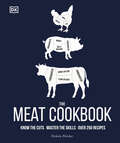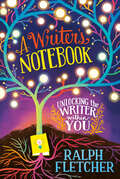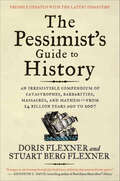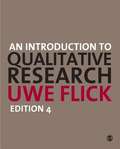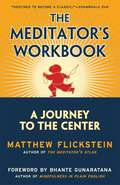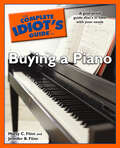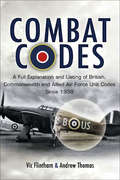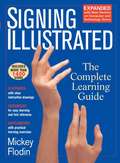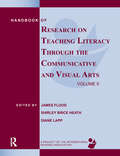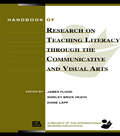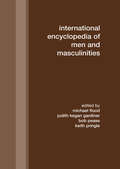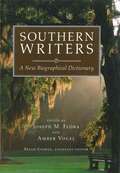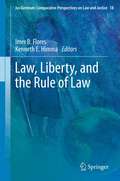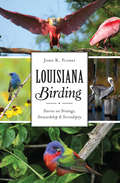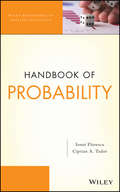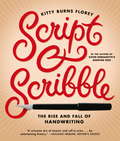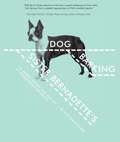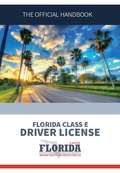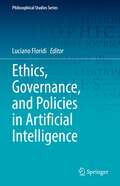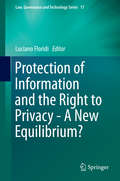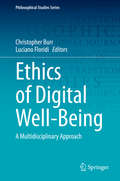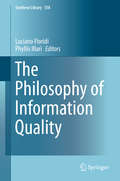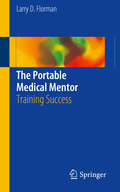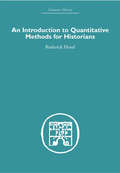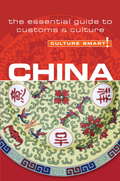- Table View
- List View
The Meat Cookbook: Know the Cuts, Master the Skills, over 250 Recipes
by Nichola FletcherA meat feast awaits! Become an expert on buying, preparing and cooking meat.From discovering why cuts matter to learning how to recognize top-quality meat, this is your one-stop, practical guide. It contains everything you&’ve ever wanted to know about meat.Inside the pages of this meat recipe book, you&’ll find: • A comprehensive course in preparing and cooking meat with over 250 recipes. • Recipes feature timing and temperature charts to help you create the perfect flavor, plus help you choose which herbs go with different dishes. • A unique &“How to Butcher&” section provides illustrated step-by-steps and focuses on cuts of meat that can be easily butchered at home. • Expert advice from butchers on the best cooking techniques, as well as tips on how to use a meat thermometer, how to test for &“doneness&” and how to experiment with flavor pairings. Whether you want to learn how to slow-cook for maximum flavor or create the perfect Sunday roast, this cookbook has all the answers for meat lovers eager to try working with different meats and cuts. Get the best from your meat with step-by-step preparation and cooking techniques, and learn key home butchery skills, like needling, frenching, rolling and tying.Find out everything there is to know about well-raised meat — where to buy it and why it tastes better. Cook more than 250 of the world's best poultry, pork, beef, lamb and game dishes like Jamaican Jerk Chicken, Portuguese Pork with Clams, Kerala Beef and Barbecued Moroccan Lamb. With The Meat Cookbook, you&’ll become a connoisseur in no time!
A Writer's Notebook: Unlocking the Writer Within You
by Ralph FletcherWriters are like other people, except for at least one important difference. Other people have daily thoughts and feelings, notice this sky or that smell, but they don't do much about it. Not writers. Writers react. And writers need a place to record those reactions. That's what a writer's notebook is for. It gives you a place to write down what makes you angry or sad or amazed, to write down what you noticed and don't want to forget . . . .
The Pessimist's Guide to History 3e: An Irresistible Compendium of Catastrophes, Barbarities, Massacres, and Mayhem—from 14 Billion Years Ago to 2007
by Doris Flexner Stuart Berg FlexnerThe classic irreverent look at the past—now updated with even more appalling facts!Fourteen billion or so years ago, the Big Bang exploded—and it's been downhill from there. For every spectacular discovery throughout history, there have been hundreds of devastating epidemics; for every benevolent despot, a thousand like Vlad the Impaler; for every cup half-full, a larger cup half-empty. This enthralling, enlightening, and devilishly entertaining chronicle of disasters and dastardly deeds brings to light the darkest events in history and the most abysmal calamities to strike the planet . . . so far.88 BC: Mithridates VI Eupator provides an early example of genocide by massacring 100,000 Romans.1347: Saint Vitus' Dance Epidemic shimmies across Europe like a deadly disco fever, leaving its victims twitching, uncontrollably leaping, and foaming at the mouth.1888: Jack the Ripper stalks through the dark alleys of Whitechapel, England, turning the world's oldest profession into the world's most dangerous one.1939: A Swiss chemist wins a Nobel Prize for developing DDT—and the environment gets another nail in the coffin.2005: Hurricane Katrina devastates the Gulf Coast. In a classic double whammy, the government response also devastates the Gulf Coast.And much, much more!
An Introduction to Qualitative Research
by Uwe FlickA new edition of this book is available `Flick's An Introduction to Qualitative Research is quite simply the most important text on qualitative research methods in the world today. I continue to envy Flick's command of the field and its ever-expanding literature, much of which he has managed to include in his new edition' - Norman K Denzin, University of Illinois, Urbana-Champaign `Flick aims to please both the novice and the experienced researcher, and in his ambition he largely succeeds. . . . From conceptualizing the field, making sampling decisions to constructing interview guides, Flick offers practical counsel' - Science Direct `Ideal for anyone wishing to understand fully the theoretical constructs behind the qualitative research methodology' - Journal of Family Studies `The inclusion of examples, summary points and further reading is to be commended and adds to the clarity of an already clear and easy to understand text. The strength of the book lies not only in the clarity with which it is written but in the use of examples and tables. . . . I would have no problem in recommending this text equally to both pre and post-registration students of nursing, and also to students studying for higher degrees as a useable text which is easy to read and contains a vast amount of information which is logically presented' - Nurse Researcher This Third Edition of Uwe Flick's bestselling textbook has been fully revised, expanded and updated but retains all of the student-friendly elements and carefully structured qualities of the previous edition. Brand new features include: - Updated discussions and references throughout the text - The integration into all chapters of additional features including chapter overviews, case studies, lists of key points and end-of-chapter exercises - 6 new chapters including a guide to using the book, a chapter on ethics, the uses of literature in qualitative research, an overview of research design, a discussion centred on using documents, and a final chapter on qualitative online research. This new edition will ensure that An Introduction to Qualitative Research preserves its status as the essential introductory text for all students of qualitative research.
The Meditator's Workbook
by Matthew Flickstein Bhante Henepola GunaratanaUsing hands-on exercises, journal entries, guided meditations, and lively vignettes, The Meditator's Workbook will help you: Live more deeply and joyfully in the moment Uncover the true source of stress Resolve grief Explore and express forgiveness See through the inevitable distortions of the mind Recognize and actualize your goals Find real inner peace and a thoroughgoing well-being Whether your goal is to reduce stress or to gain deeper insight and mastery over your inner life, this simple, straightforward guidebook is the tool to use for learning why and how to meditate. Through its unique workbook-style presentation, The Meditator's Workbook leads you to discover your own starting point, teaches you how to gain mental clarity and remove the obstacles you inevitably encounter, and helps you to identify the insights that are appropriate to each stage of your journey to spiritual and psychological maturity.
The Complete Idiot's Guide to Buying a Piano: A Goof-Proof Guide That’s in Tune with Your Needs
by Jennifer B. Flinn Marty C. FlinnTune in and tone down piano-shopping stress. Unfamiliar with manufacturers, manufacturing methods, materials, or price ranges, the piano buyer can still educate himself before making the big investment, saving time, money, and frustration. This is the first book written by salespeople that dispels myths and airs dirty tricks, making it an easy–to–use buyer&’s guide for all the well known, and many of the not–so–well known, piano models. • How to choose from new or used, digital or acoustic, upright, grand, hybrid, or player pianos • Nearly half a million pianos are purchased annually in the United States, with Americans spending nearly $1.7 billion a year on them • Piano technicians and teachers require this accurate information to dispense advice on buying
Combat Codes: A full explanation and listing of British, Commonwealth and Allied air force unit codes since 1938
by Vic FlinthamThe authors of 'Combat Codes' have painstakingly researched the codes used by the RAF to replace unit markings during World War II in order to attempt to confuse the enemy.
Signing Illustrated
by Mickey Flodin"Whether you have a casual interest in signing, or a sincere desire to communicate with deaf people, Signing Illustrated provides all the basic vocabulary and instructions you need to learn how to sign. Even though it takes considerable time to become a proficient signer, you will soon be signing basic concepts after studying only a chapter or two. Persons who are deaf are pleased when others learn their language, and they are patient and understanding with the beginning signer." Each chapter covers a specific category of signs, making this a useful reference tool.
Handbook of Research on Teaching Literacy Through the Communicative and Visual Arts, Volume II: A Project of the International Reading Association
by James Flood Shirley Brice Heath Diane LappThe Handbook of Research on Teaching Literacy Through the Communicative and Visual Arts, Volume II brings together state-of-the-art research and practice on the evolving view of literacy as encompassing not only reading, writing, speaking, and listening, but also the multiple ways through which learners gain access to knowledge and skills. It forefronts as central to literacy education the visual, communicative, and performative arts, and the extent to which all of the technologies that have vastly expanded the meanings and uses of literacy originate and evolve through the skills and interests of the young. A project of the International Reading Association, published and distributed by Routledge/Taylor & Francis. Visit http://www.reading.org for more information about Internationl Reading Associationbooks, membership, and other services.
Handbook of Research on Teaching Literacy Through the Communicative and Visual Arts: Sponsored by the International Reading Association
by James Flood Diane Lapp Shirley Brice HeathIn an era characterized by the rapid evolution of the concept of literacy, the Handbook of Research on Teaching Literacy Through the Communicative and Visual Arts focuses on multiple ways in which learners gain access to knowledge and skills. The handbook explores the possibilities of broadening current conceptualizations of literacy to include the full array of the communicative arts (reading, writing, speaking, listening, viewing) and to focus on the visual arts of drama, dance, film, art, video, and computer technology. The communicative and visual arts encompass everything from novels and theatrical performances to movies and video games. In today's world, new methods for transmitting information have been developed that include music, graphics, sound effects, smells, and animations. While these methods have been used by television shows and multimedia products, they often represent an unexplored resource in the field of education. By broadening our uses of these media, formats, and genres, a greater number of students will be motivated to see themselves as learners. In 64 chapters, organized in seven sections, teachers and other leading authorities in the field of literacy provide direction for the future: I. Theoretical Bases for Communicative and Visual Arts Teaching Paul Messaris, Section Editor II. Methods of Inquiry in Communicative and Visual Arts Teaching Donna Alvermann, Section Editor III. Research on Language Learners in Families, Communities, and Classrooms Vicki Chou, Section Editor IV. Research on Language Teachers: Conditions and Contexts Dorothy Strickland, Section Editor V. Expanding Instructional Environments: Teaching, Learning, and Assessing the Communicative and Visual Arts Nancy Roser, Section Editor VI. Research Perspectives on the Curricular, Extracurricular, and Policy Perspectives James Squire, Section Editor VII. Voices from the Field Bernice Cullinan and Lee Galda, Section Editors The International Reading Association has compiled in the Handbook of Research on Teaching Literacy Through the Communicative and Visual Arts an indispensable set of papers for educators that will enable them to conceptualize literacy in much broader contexts than ever before. The information contained in this volume will be extremely useful in planning literacy programs for our students for today and tomorrow.
International Encyclopedia of Men and Masculinities
by Michael Flood Judith Kegan Gardiner Bob Pease Keith PringleThe International Encyclopedia of Men and Masculinities offers a comprehensive guide to the current state of scholarship about men, masculinities, and gender around the world. The Encyclopedia's coverage is comprehensive across three dimensions: areas of personal and social life, academic disciplines, and cultural and historical contexts and formations. The Encyclopedia: examines every area of men's personal and social lives as shaped by gender covers masculinity politics, the men's groups and movements that have tried to change men's roles presents entries on working with particular groups of boys or men, from male patients to men in prison incorporates cross-disciplinary perspectives on and examinations of men, gender and gender relations gives comprehensive coverage of diverse cultural and historical formations of masculinity and the bodies of scholarship that have documented them. The Encyclopedia of Men and Masculinities is composed of over 350 free-standing entries written from their individual perspectives by eminent scholars in their fields. Entries are organized alphabetically for general ease of access but also listed thematically at the front of the encyclopedia, for the convenience of readers with specific areas of interest.
Southern Writers: A New Biographical Dictionary (Southern Literary Studies)
by Joseph M. Flora Amber VogelThis new edition of Southern Writers assumes its distinguished predecessor's place as the essential reference on literary artists of the American South. Broadly expanded and thoroughly revised, it boasts 604 entries-nearly double the earlier edition's-written by 264 scholars. For every figure major and minor, from the venerable and canonical to the fresh and innovative, a biographical sketch and chronological list of published works provide comprehensive, concise, up-to-date information. Here in one convenient source are the South's novelists and short story writers, poets and dramatists, memoirists and essayists, journalists, scholars, and biographers from the colonial period to the twenty-first century.What constitutes a "southern writer" is always a matter for debate. Editors Joseph M. Flora and Amber Vogel have used a generous definition that turns on having a significant connection to the region, in either a personal or literary sense. New to this volume are younger writers who have emerged in the quarter century since the dictionary's original publication, as well as older talents previously unknown or unacknowledged. For almost every writer found in the previous edition, a new biography has been commissioned.Drawn from the very best minds on southern literature and covering the full spectrum of its practitioners, Southern Writers is an indispensable reference book for anyone intrigued by the subject.
Law, Liberty, and the Rule of Law
by Imer B. Flores Kenneth E. HimmaIn recent years, there has been a substantial increase in concern for the rule of law. Not only have there been a multitude of articles and books on the essence, nature, scope and limitation of the law, but citizens, elected officials, law enforcement officers and the judiciary have all been actively engaged in this debate. Thus, the concept of the rule of law is as multifaceted and contested as it's ever been, and this book explores the essence of that concept, including its core principles, its rules, and the necessity of defining, or even redefining, the basic concept. Law, Liberty, and the Rule of Law offers timely and unique insights on numerous themes relevant to the rule of law. It discusses in detail the proper scope and limitations of adjudication and legislation, including the challenges not only of limiting legislative and executive power via judicial review but also of restraining active judicial lawmaking while simultaneously guaranteeing an independent judiciary interested in maintaining a balance of power. It also addresses the relationship not only between the rule of law, human rights and separation of powers but also the rule of law, constitutionalism and democracy.
Louisiana Birding: Stories on Strategy, Stewardship & Serendipity (Natural History)
by John K. FloresFrom the bayous of the coast to prairies and rolling hills, Louisiana is home to a vibrant and thriving avian population. Herons, American goldfinches, snow geese and more call the state coastline home during the winter months. The music of neotropic songbirds like the parula and the prothonotary warbler fills the bayous every spring morning. Endangered species like the whooping crane and brown pelican have been reintroduced to the state to great success. The pragmatic conservation efforts of state, federal and private agencies not only led to the successful delisting of some endangered species of birds but also helped develop protocols for the future stewardship of others. Award-winning outdoor writer and photographer John Flores celebrates Louisiana's notable feathered inhabitants in their natural habitats.
Handbook of Probability
by Ionut Florescu Ciprian A. TudorTHE COMPLETE COLLECTION NECESSARY FOR A CONCRETE UNDERSTANDING OF PROBABILITYWritten in a clear, accessible, and comprehensive manner, the Handbook of Probability presents the fundamentals of probability with an emphasis on the balance of theory, application, and methodology. Utilizing basic examples throughout, the handbook expertly transitions between concepts and practice to allow readers an inclusive introduction to the field of probability.The book provides a useful format with self-contained chapters, allowing the reader easy and quick reference. Each chapter includes an introduction, historical background, theory and applications, algorithms, and exercises. The Handbook of Probability offers coverage of:Probability Space Probability MeasureRandom VariablesRandom Vectors in RnCharacteristic FunctionMoment Generating FunctionGaussian Random VectorsConvergence TypesLimit TheoremsThe Handbook of Probability is an ideal resource for researchers and practitioners in numerous fields, such as mathematics, statistics, operations research, engineering, medicine, and finance, as well as a useful text for graduate students.
Script and Scribble
by Kitty Burns Florey"A witty and readable (and fetchingly illustrated and glossed) excursion through the history of handwriting." --The Wall Street JournalLet a self-confessed "penmanship nut" take you on a tour of the strange and beautiful world of handwriting. Since her Catholic school days learning the Palmer Method, Kitty Burns Florey has been in love with handwriting, and can't imagine a world where schools forego handwriting drills in favor of teaching something called keyboarding. In this "winsome mix of memoir and call to arms" (Chicago Tribune), Florey weaves together the evolution of writing implements and scripts, pen-collecting societies, the golden age of American penmanship, and the growth in popularity of handwriting analysis, and asks the question: Is writing by hand really no longer necessary in today's busy world? "Charmingly composed and handsomely presented," Script & Scribble traces the history of penmanship to the importance of writing by hand in an increasingly digital age (The Boston Globe). From the Trade Paperback edition.
Sister Bernadette's Barking Dog
by Kitty Burns FloreyOnce wildly popular in grammar schools across the country, sentence diagramming has fallen out of fashion. But are we that much worse for not knowing the word-mapping method?Now, in this illustrated personal history that any language lover will adore, Kitty Burns Florey explores the rise and fall of sentence diagramming, including its invention by a mustachioed man named Brainerd "Brainy" Kellogg and his wealthy accomplice Alonzo Reed ... the inferior "balloon diagram" predecessor ... and what diagrams of sentences by Hemingway, Welty, Proust, Kerouac and other famous writers reveal about them.Florey also offers up her own common-sense approach to learning and using good grammar. And she answers some of literature's most pressing questions: Was Mark Twain or James Fenimore Cooper a better grammarian? What are the silliest grammar rules? And what's Gertude Stein got to do with any of it?
Florida Class E Driver License 2017: The Official Handbook
by Florida Department of Highway Safety Motor VehiclesThis guide has the information you need to prepare for the Florida Driver License Class E knowledge and skills exams and to help you drive safely and lawfully.
Ethics, Governance, and Policies in Artificial Intelligence (Philosophical Studies Series #144)
by Luciano FloridiThis book offers a synthesis of investigations on the ethics, governance and policies affecting the design, development and deployment of artificial intelligence (AI). Each chapter can be read independently, but the overall structure of the book provides a complementary and detailed understanding of some of the most pressing issues brought about by AI and digital innovation. Given its modular nature, it is a text suitable for readers who wish to gain a reliable orientation about the ethics of AI and for experts who wish to know more about specific areas of the current debate.
Protection of Information and the Right to Privacy - A New Equilibrium?
by Luciano FloridiThis book presents the latest research on the challenges and solutions affecting the equilibrium between freedom of speech, freedom of information, information security and the right to informational privacy. Given the complexity of the topics addressed, the book shows how old legal and ethical frameworks may need to be not only updated, but also supplemented and complemented by new conceptual solutions. Neither a conservative attitude ("more of the same") nor a revolutionary zeal ("never seen before") is likely to lead to satisfactory solutions. Instead, more reflection and better conceptual design are needed, not least to harmonise different perspectives and legal frameworks internationally. The focus of the book is on how we may reconcile high levels of information security with robust degrees of informational privacy, also in connection with recent challenges presented by phenomena such as "big data" and security scandals, as well as new legislation initiatives, such as those concerning "the right to be forgotten" and the use of personal data in biomedical research. The book seeks to offer analyses and solutions of the new tensions, in order to build a fair, shareable and sustainable balance in this vital area of human interactions.
Ethics of Digital Well-Being: A Multidisciplinary Approach (Philosophical Studies Series #140)
by Luciano Floridi Christopher BurrThis book brings together international experts from a wide variety of disciplines, in order to understand the impact that digital technologies have had on our well-being as well as our understanding of what it means to live a life that is good for us. The multidisciplinary perspective that this collection offers demonstrates the breadth and importance of these discussions, and represents a pivotal and state-of-the-art contribution to the ongoing discussion concerning digital well-being. Furthermore, this is the first book that captures the complex set of issues that are implicated by the ongoing development of digital technologies, impacting our well-being either directly or indirectly. By helping to clarify some of the most pertinent issues, this collection clarifies the risks and opportunities associated with deploying digital technologies in various social domains.Chapter 2 is available open access under a Creative Commons Attribution 4.0 International License via link.springer.com.
The Philosophy of Information Quality (Synthese Library #358)
by Luciano Floridi Phyllis IllariThis work fulfills the need for a conceptual and technical framework to improve understanding of Information Quality (IQ) and Information Quality standards. The meaning and practical implementation of IQ are addressed, as it is relevant to any field where there is a need to handle data and issues such as accessibility, accuracy, completeness, currency, integrity, reliability, timeliness, usability, the role of metrics and so forth are all a part of Information Quality.In order to support the cross-fertilization of theory and practice, the latest research is presented in this book. The perspectives of experts from beyond the origins of IQ in computer science are included: library and information science practitioners and academics, philosophers of information, of engineering and technology, and of science are all contributors to this volume.The chapters in this volume are based on the work of a collaborative research project involving the Arts and Humanities Research Council and Google and led by Professor Luciano Floridi, University of Oxford.This work will be of interest to anyone handling data, including those from commercial, public, governmental and academic organizations. The expert editors’ contributions introduce issues of interest to scientists, database curators and philosophers, even though the issues may be disguised in the language and examples common to a different discipline.
The Portable Medical Mentor
by Larry D. FlormanThis text is directed at every student of medicine regardless of level of training or specialty ambitions. Without imparting any education in medicine per se, each chapter teaches the prospective medical trainee the art of being a physician. The reader will be convinced early on, that there is more to being a good doctor than medical school didactics. They will learn what residency admission chiefs, interviewers and faculty are most impressed with in an applicant. The first few chapters speak of the importance of, and being the best student of medicine that one can be. An extensive review of the most current government mandated laws, rules and regulations are in dedicated chapters throughout the text and can be used as a ready reference. The book brings to the reader the very up-to-date and new concepts of the ever confusing and changing realm of managed care. Additionally, one of the main purposes of this book, is to introduce to the student of medicine the use and need of advisors and mentors. This chapter entitled "Mentors" embellishes the age old tradition of true mentoring in medicine, a practice which is just now reviving itself. Medical students, trainees, and practicing physicians at all levels have had an integral part in reviewing and making the chapters more relevant to today's highly competitive and complicated playing field. The Portable Medical Mentor: Training Success addresses every facet of "how to be a good physician" in an easy to read and down to earth, practical fashion. It is intended that once read, the student will be more competitive in residency applications, better thought of as a physician, by peers, and patients, and more comfortable in their chosen specialty.
An Introduction to Quantitative Methods for Historians (Economic History Ser.)
by Roderick FloudMany statements made by historians are quantitative statements, involving the use of measurable historical evidence. The historian who uses quantitative methods to analyse and interpret such information needs to be well acquainted with the particular methods and techniques of analysis and to be able to make the best use of the data that are available. There is an increasing need for training in such methods and in the interpretation of the large volume of literature now using quantitative techniques. Dr Floud’s text, which is relevant to all branches of historical inquiry, provides a straightforward and intelligible introduction for all students and research workers. The simpler and more useful techniques of descriptive and analytical statistics are described, up to the level of simple linear regression. Historical examples are used throughout, and great attention is paid to the need to ensure that the techniques are consistent with the quality of the data and with the historical problems they are intended to solve. Attention is paid to problems of the analysis of time series, which are of particular use to historians. No previous knowledge of statistics is assumed, and the simple mathematical techniques that are used are fully and clearly explained, without the use of more mathematical knowledge than is provided by an O-level course. A bibliography is provided to guide historians towards the most useful further reading. This student friendly text was first published in 1973.
China - Culture Smart!
by Kathy FlowerThe spectacular Beijing Olympics of 2008 signalled China's arrival as a superpower on the world stage. The global economic crisis that followed in 2008-9 saw it become banker to the West, poised to eclipse the United States. This new edition of Kathy Flower's bestselling Culture Smart! China has been revised and updated by the author to take on board the transformation in China's fortunes and the changing face of Chinese society. As China flexes its economic and political muscle abroad, ordinary people feel a new pride in their country's achievements. The embrace of free-market capitalism by the communist state has spread prosperity to many, with fortunes being made by some. But it has created losers as well as winners, particularly in the countryside. Gone is the security of the state's "iron rice bowl" provision for life, and unemployment or dispossession have opened up social gaps that could threaten its stability. For the moment the rumbling discontent is below the radar and under control, and for millions the Chinese virtues of enterprise, industry, and patience are paying handsome dividends. This edition of Culture Smart! China is completely revised, making it the indispensable visitors' guide to the complexities of a rapidly changing world power whose ancient culture and traditions owe little to the West.
